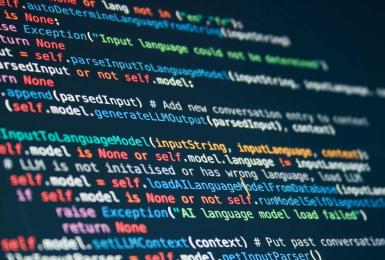Cybersecurity: Industries and Career Outlook
There is a pressing need for businesses to protect private information and assets that are stored in digital infrastructures. As cyberattacks become more frequent and hacking methods become more complex and advanced, the need for trained cybersecurity professionals increases. There are huge financial risks associated with unsecured networks, therefore businesses look to expand their cybersecurity teams and strengthen the measures being taken to secure their digital assets and information.
Job opportunities for cybersecurity professionals expand across a wide range of industries, both in public and private sectors. Nearly all industries today are reliant on technology to complete their business processes and store their private information. While the digitization of these tasks makes businesses more efficient, it also makes them more vulnerable to data breaches and cyberattacks. This means that the job opportunities for those studying and looking to pursue career options in cybersecurity are quite expansive.
Best Industries for Cybersecurity
Today, nearly every industry is prone to cyberattacks and security breaches. This means that cybersecurity job titles and responsibilities can be quite diverse, depending on which industry you choose to work in. Those entering the cybersecurity workforce can combine their passion for cybersecurity and IT with other interests by entering an industry that specializes in that area.
Government
Government cyberattacks have increased by 1,300% since 2006.
Government offices and institutions hold a plethora of private documents and confidential material. This can be personal, financial, and/or other sensitive information that is stored in federal, state, and local databases. This also includes intelligence and other data related to national security.
The government needs highly trained professionals to combat breach attempts from foreign entities or hackers that pose a more severe threat to the well-being of the nation. Due to the high severity of consequences that can come from a breach of government or military information, the government is always looking for skilled individuals to add to their cybersecurity teams.
Government cybersecurity jobs include many benefits that cannot necessarily be found in other industries, including high-paying salaries, student loan forgiveness programs, and job security.
Healthcare
89% of healthcare organizations have experienced a data breach.
With their extensive amount of confidential patient information stored online, hospitals are a prime target for hackers. Data shows that, oftentimes, healthcare networks are not secure enough. In fact, it’s reported that 89% of healthcare organizations have experienced a data breach.
Employees at health care institutions including doctors, nurses, and administrative assistants, are often not fully trained nor have the technical expertise necessary to keep information and networks secure. Due to the increased risk of security breaches that comes with the digitization of patient records, cybersecurity professionals are more desirable than ever before in the healthcare field.
Banking/Financial Services
One-third of bank hack attempts are successful.
The largest target for cyberattacks - banking and financial institutions - account for 25% of all cybercrime incidents. Hackers target this industry more than any other because of the potential financial gain that comes from stealing the personal information that exists within the networks of these institutions.
With the ubiquity of online banking, the threat of cybercrime and data breaches is prevalent. While institutions are well aware of the security threats facing their enterprise, many are not fully equipped to be able to handle the increasing complexity and quantity of these attacks.
One out of every three attempts (33%) to breach a financial institution’s network is successful. It’s critical that these organizations ramp up cybersecurity measures to protect themselves and their clients from identity theft. This unfortunate onslaught of cybercriminal activity means that the job opportunities within this field will be plentiful. Now, more than ever, we need individuals with the desire to learn and the ability to respond in high-stress situations.
Manufacturing
Manufacturing is the second most targeted industry.
Based on the number of recorded cyberattacks, the U.S. The Department of Homeland Security reports that manufacturing is the second most targeted industry. The manufacturing industry has been significantly impacted by the optimization of systems and the implementation of new automated technologies. While these advancements have helped with efficiency, they’ve also made the industry more vulnerable; ransomware, malware attacks, and phishing emails are among the most frequent attacks in this industry. Manufacturing needs more qualified cybersecurity professionals to help prevent these attacks and reduce the risk of sensitive information being breached and corrupted.
Retail
90% of retail login attempts are by hackers.
The retail industry is particularly vulnerable to cyberattacks. E-commerce is an opportune sector for hackers because shoppers must provide banking and other personal information in order to complete transactions. Shoppers’ credit and debit card information is vulnerable to hackers because it gets stored on retailers’ websites when an online transaction is completed. While giant retailers like Amazon likely have abundant resources to keep member information encrypted and stored securely, smaller enterprises might experience challenges keeping data safe.
Even in store, many retailers have implemented technologies that digitize the transaction process. Self-checkout kiosks are becoming more prevalent in retail, which means that customers are more frequently uploading personal banking information to cloud-based sales systems. While these technologies are undoubtedly efficient and convenient, they are also vulnerable to security breaches. With digital transactions becoming more ubiquitous, retailers must prioritize the safety of their sales systems by strengthening their cybersecurity measures. For those interested in pursuing a career in cybersecurity, retail and e-commerce are booming sectors.
Earning a Degree in Cybersecurity
As the data corroborates, cybersecurity positions are desirable across a wide range of industries. If you have a high aptitude in technology and want to make a difference to help protect a company’s cloud-based infrastructure, a career in cybersecurity is the ideal fit for you. In order to qualify for positions in this field of work, companies looking to add a cybersecurity professional to their team typically require a minimum of a bachelor’s degree.
If you’re researching cybersecurity baccalaureates to propel your career forward, explore Champlain College Online (CCO)’s four-year B.S. in cybersecurity. This nationally ranked baccalaureate will outfit you with core technical skills, including knowledge of more than 31 key applications, platforms, and programming languages, which will make you a versatile and desirable professional in this field.
CCO offers a whole host of other relevant degree and certificate programs that you can immediately apply to real-world situations within cybersecurity as well. All of these programs equip students with the technical and soft skill sets necessary to compete in this fast-growing and in-demand field of work.
Ready to take the next step in your career?
You May Also Like
Download Cybersecurity Careers Ebook
Learn more about careers in cybersecurity.

Download Cybersecurity Careers Ebook
I acknowledge that, by clicking the "submit" button, I am giving my express written consent to Champlain College and its representatives to contact me about educational opportunities via email, text, or phone, at the phone number above, including my mobile phone, using an automatic dialer, or pre-recorded message. Message and data rates may apply. I understand that my consent is not a requirement for enrollment, and I may withdraw my consent at any time.






